hankyoreh
Links to other country sites 다른 나라 사이트 링크
“Happiness is a beautiful sentence”: Arundhati Roy discusses the pandemic, activism and writing
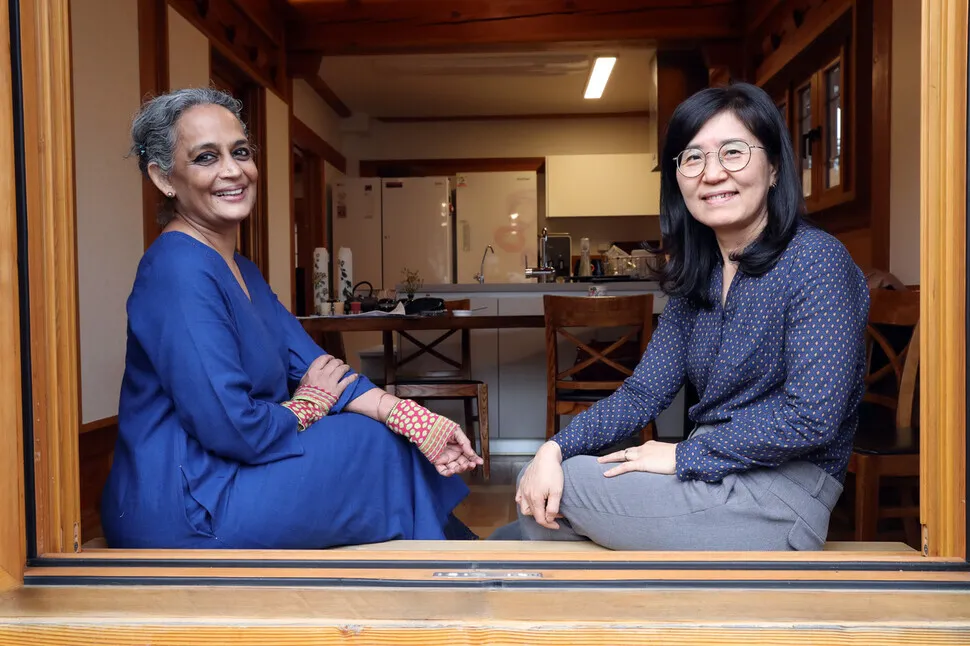
Arundhati Roy, the Indian writer who rose to global fame when her 1997 debut novel “The God of Small Things” was awarded the Booker Prize — one of the top literary honors in the Anglophone world — recently paid her first-ever visit to Korea.
The Hankyoreh sat down for an exclusive conversation with Roy, who was in Korea to receive the Lee Hochul Literary Prize for Peace, for which she became the fourth Grand Prize Laureate.
Speaking to Roy was Park Hye-young, an Inha University professor and scholar of English literature who previously translated Roy’s essay “Come September.” The conversation took place on Wednesday afternoon at a guest house in Eunpyeong Hanok Village, a complex of traditional Korean homes in Seoul where Roy was staying for the duration of her trip.
Park: It’s an honor to have Arundhati Roy, a leading writer and activist and the winner of last year’s Lee Hochul Literary Prize for Peace. And she has earned numerous honors so far, including the Booker Prize, the Lannan Cultural Freedom Prize, the Sydney Peace Prize, the Norman Mailer Prize, and last year she finally received the Lee Hochul Literary Prize for Peace.
She has also published two important novels, the first being Booker Prize-winner “The God of Small Things,” published in 1997. After 20 years, she finally published her second novel, “The Ministry of the Utmost Happiness” in 2017. In between, she has published many essays with themes on politics, global politics, globalization, displacement, the push to privatize public goods and more. Her novels are very touching and intelligent, and at the same time, humorous and revolutionary; not to mention her political essays and nonfiction. It's amazing that those two seemingly different genres have a very strong connection in terms of the topic and subject.
I'd like to start our interview with a question regarding the COVID-19 pandemic in India. As you know, India is a kind of a special country for many Korean people because some Koreans choose India as their final destination for a spiritual journey in search of their own identity. At the same time, you come across different sides of India in the news, such as the gang rape of a college-aged woman in front of her boyfriend on a bus. In this way, I think that India is a very big mixture of bright and dark sides.
In terms of the COVID-19 pandemic in India, a lot of people have lost their jobs, family members and loved ones. A lot of working people in India, in particular, had to migrate from cosmopolitan cities like New Delhi to their own rural countryside homes because they were sacked from their jobs and could not afford to stay in the city. This was because of Modi’s very abrupt and unexpected policy of lockdown, for which he didn't give people enough time to prepare. So, it seems there are a lot of problems in India. What do you think of the situation then and now in India?
Roy: The idea of people go to India to seek spiritual enlightenment or peace — not just from Korea, but all over the world — you know, it's a cliche. This is interesting, because I think what brings people peace somehow is the chaos of India and the fact that it seems to be not regulated in a way Western worlds or Korean societies are. Actually, what brought tears to your eyes in “The God of Small Things” is very much a part of what is supposed to be Indian spirituality. The caste system is a part of Hinduism and it is a most brutal form of social hierarchy practice. So the inside is the spirituality that outsiders seek — for insiders it's a very strict social hierarchy. India has always been a very violent place. Some of us say that the reason that people talk so much about Gandhi and nonviolence is because it's such a violent society. To keep the caste system in place, even today, requires a lot of violence. The threat of violence as well as the application of violence — to keep women in their place requires a lot of violence. The feudal traditional culture contains within it violence against women while the women that are modernizing are also being punished. Anyway, it's a very contradictory society. But today the very spiritualism that you are talking about has been politically harnessed to create Hindu nationalism.
When we use the word India, sometimes I want to ask: “What do you mean? What is the India you know?” India is like, let's say, the Soviet Union used to be — it has so many sub-nationalities, 28 official languages, 30 languages that want to be called official, and 3000 dialects. Hinduism is not a word that Hindus used to use to describe themselves. It was a word that first the Moguls and then the British used to describe people who lived east of the Indus River. But Hindus would always describe themselves according to their caste: “I'm a Brahmin,” “I'm a Dalit,” “I'm an ‘untouchable.’” So today you have a country that has thousands of different castes, thousands of languages, hundreds of religions, sub ethnicities and the Hindu nationalist government. He [Modi] is saying one language, one religion, one country — that is like trying to create a nuclear explosion in a very complex society. It's like taking an ocean and turning it into a glass of water. It's a very violent churning that's happening. So that's the background. Now to talk about the pandemic.
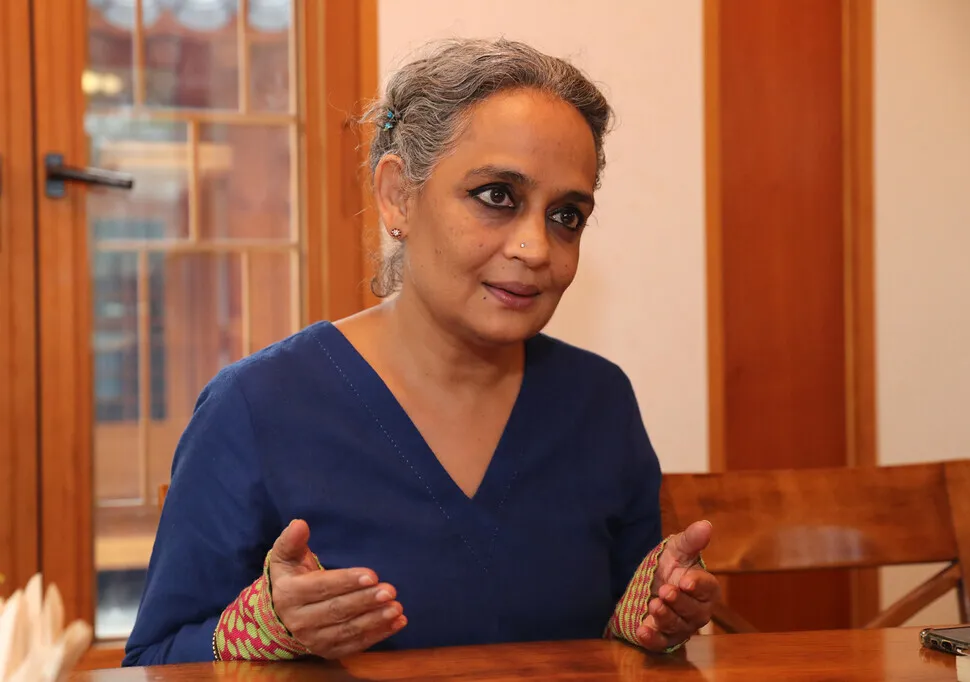
When the pandemic first broke out in Europe and then in the US, the Indian government pretended that it didn’t have anything to do with us. The World Health Organization had already declared it [a pandemic on March 11, 2020], but the Indian government was not interested. There were two things happening at the time: one was that they had just passed a new citizenship law — a new anti-Muslim citizenship law. With this new citizenship law, the government asked citizens to produce a certain set of documents, but none of us have those documents. I think the last time somebody tried to do this was Nazi Germany's Nuremberg Laws, by which the state would decide, according to a set of documents, and approve whether you are a citizen or not. In the state of Assam, in northeastern India, that's already happened and some 2 million people have been made stateless. There were huge protests which started late in 2019 and 2020. While other countries are dealing with refugees, India is trying to manufacture refugees — it's trying to take away citizenship from millions of people. Then, in February, Donald Trump visited India, during which time there was a massacre of Muslims in Delhi. And then he left, and the COVID cases started building, the protesters were in the streets. In March, Modi, overnight — like an ambush — called a lockdown with four hours’ notice. I was in Delhi the next day and saw millions of people in the streets of the city. It was like an ambush, like the people of the country were the prime minister's enemies — we were shocked and surprised. 1.38 billion people under lockdown with just four hours’ notice. It's like the prime minister had no idea what country he’s the prime minister of. There are millions of non-formal workers working in cities in unbelievable conditions, and suddenly, because of this lockdown, they appeared on the streets. They had no money, they had no jobs, they had no shelter — so they began to walk thousands of kilometers home to their villages. It was like a biblical exodus. On the way, they were beaten, they were sprayed with insecticides. They ordered a lockdown to enforce social distancing in India. But in India, lockdown is a social physical compression: everyone is locked into their buses, locked into trains.
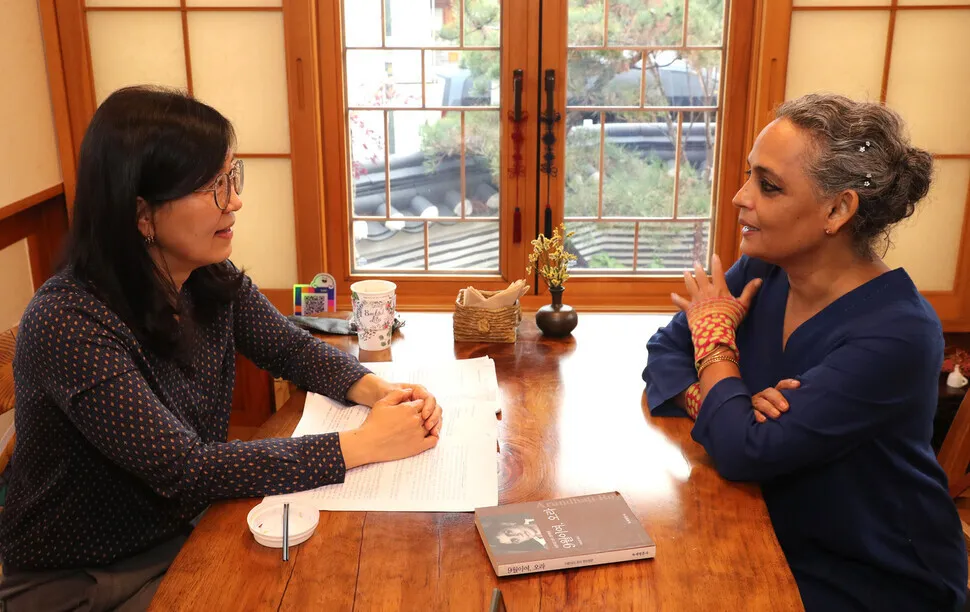
Park: In that sense, do you think social distancing in India has a different meaning and significance in comparison with Western countries?
Roy: Because India is a country that practices caste, when you say social distancing, it has a very terrible connotation, you know.
After the first wave, Modi came out saying, “India is fine, we are an example to the rest of the world,” then the second wave hit, in which 400,000 people died in Delhi. That’s the official number, but the unofficial figure is supposed to be 10 times more. People were dying on the streets, people were dying in parking lots and hospitals. There was no firewood to burn in the crematoriums, there was no place to bury them. Bodies were floating down the river. Everyone was desperate. And the minute that wave ended, there were posters all over Delhi saying “Thank you, Modi, for free vaccination” — which were not free. During all this, the media — which is very pro-Modi and very pro-corporate — started demonizing Muslims, saying, “Muslims are causing COVID-19. Muslims are deliberately spreading COVID-19.” Again, it was like the Nazi propaganda about Jews that said they were spreading typhus. The pandemic, and Hindu nationalism — which we should call Hindu fascism or Hindu nationalist fascism — became, again, something used to demonize minorities.
Park: In your essay, “The Pandemic is a Portal,” you say that which way we go is entirely up to us — we can choose this way or we can choose to leave something behind for a better society and humanity. So I wonder what kind of lessons we can learn, or whether we can take away anything positive from the catastrophic situation of a pandemic.
Roy: Well, there was this moment when the whole world was locked down and although it was a very terrifying display of discipline, you saw even powerful states coming to their knees. You saw how states that have some kind of community or medical welfare for their citizens, unlike the US, were doing much better. You saw how this kind of modern world and its lines of injustice were amplified in the pandemic. It was an X-ray, so I thought if you can see through the X-ray you can come up with a proper diagnosis. A sudden shock like that can make human beings and the people who run human society think. Like how if you have a near-death experience, you live your life differently.
Park: I found that in your political essays around 2010, you had very critical stances on topics such as American imperialism and the invasion of Iraq and Afghanistan. Nowadays I find that your concerns have moved more domestic. You very strongly criticize the Modi government. You do this because you find that Modi’s power is growing, and you are, as far as I know, always on the side of the “small,” the grassroots people. However, when it comes to India’s Muslim population, in a demographic sense, isn’t it important in order to win elections? By implementing the citizenship amendment act, most Muslims would become disenfranchised. Are Muslim votes not important for winning elections?
Roy: If you look at the way representative democracy works in India, you don't need to have a huge majority of people voting for you in order to win a huge majority of seats. Let's say you have five or 10 different parties and it's not a two-party system — even if you win 20 percent of the vote in so many constituencies, you may win 80 percent of the seats in the parliament, by winning 20 percent of the vote. In 2014 and 2019, Modi’s ruling party demonstrated that you do not need the Muslim vote.
The divide in India is unlike European fascism, unlike German Nazism where Hitler, when he came to power in Germany, first, resurrected the post-war German economy then the war came and smashed it. Whereas Modi has just smashed the economy without any resurrection. Now the big debate is between whether the people who have supported him are also supporting their own economic destruction. I have an example: Just outside my house, there's a little tea shop. There's a man who used to be a big supporter of Modi and he would not listen to anybody criticizing him. When the demonetization came [in 2016] he lost his money and his job, when the lockdown happened he lost everything. Then, one afternoon, he went and hung himself, never having criticized the person who destroyed his life.
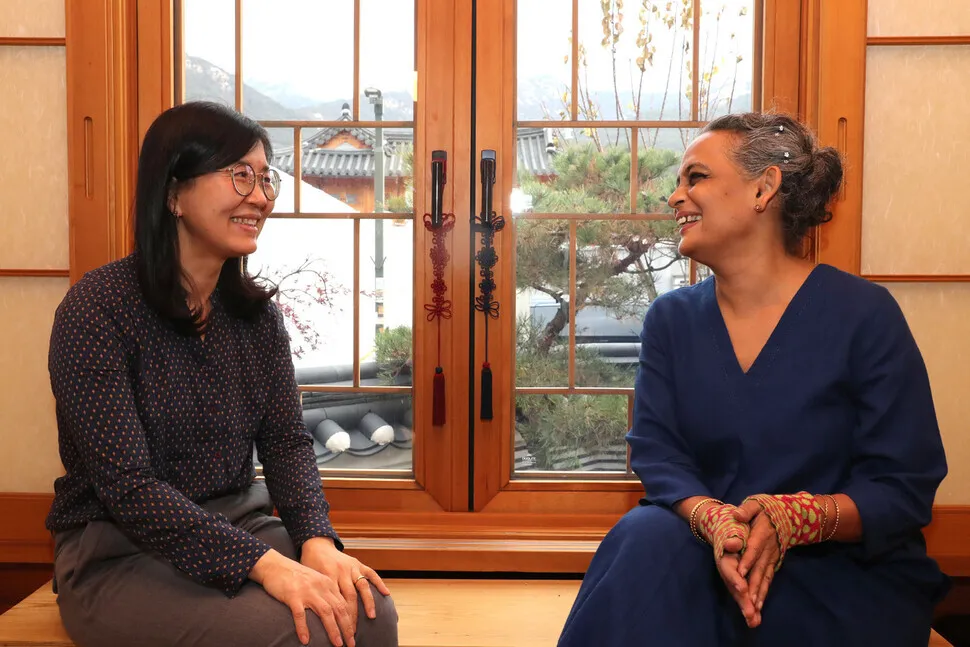
Park: You are continuously on the side of small and protest against bigger entities like institutions, legislation, courts, the media, corporations and so on. I was wondering, is it okay for you in terms of your security? Have you ever received any threats of arrest or detainment?
Roy: Well, I spent time in jail in 2002. The thing is, it's a very fluid situation. So people who are being put into jail, perhaps they are not as well known internationally as I am. So I'm protected a little because of being well known, but also I'm attacked because I’m well known. It doesn't matter if you've done something or you haven't done something — they decide to put you in jail because they don't want you out there. They make the story. Sometimes they’ll say, “She’s not in jail, so we must be a democracy.” It’s a dance. I don’t know how long it’ll be like this. Everything is a calculation.
Park: You’ve said there is a lot of oppression of the press in India. But still, you are one of the strongest critics of the Modi government. Could this be evidence that still your country has freedom of speech?
Roy: But if you look at it in the other way, I don't write and I don't speak on Indian TV. I don't write in Indian mainstream media, you know. Whatever I write, it's online or it's outside of India [such as in The Guardian].
Park: Let's go back to “The Ministry of Utmost Happiness.” I was wondering whether is there a special meaning or idea behind the character of Saddam Hussein. He’s born a Dalit, a kind of “untouchable,” and after his father dies, he converts to Islam. Can you explain what kind of ideas you had when you described such a direct grassroots, oppressed person, who converts to Islam by his own will, and how he found his own paradise in Anjum’s guest house?
Roy: Let's say that caste in India is the political engine that drives politics, as well as society, as well as it affects every single social interaction today. Less than one percent of Indians will marry outside their caste. Caste is everything there now. For centuries, Dalit — a newer word for those populations of people who were known as “untouchables” — converted to escape from caste. They converted to Islam, they converted to Sikhism, they converted to Christianity. In “The Ministry of Utmost Happiness,” it's a militant declaration by the Dalit man who converts to Islam.
There are two kinds of graveyards in the book. One is a Muslim graveyard outside of the old city of Delhi. Obviously, in India, most graveyards are Muslim graveyards because Hindus cremate their dead. So in that graveyard where Anjum lives, she slowly builds a guest house encircling the tombs of her family. And Saddam comes and then Tilottama comes, so and then they build the Jannat Guest House — meaning “paradise guest house.” Then the other part of the story, you have Kashmir which is in postcards known as Jannat, paradise. So you have in Delhi a graveyard covered with the paradise guest house and in Kashmir you have a paradise covered with graveyards from the war. If you look at the stories of the people who live in Anjum’s guest house, what happened to them, how they live, who has died, who says the prayers, you see that it's actually a revolution. Everybody there is from India, people who refuse this political notion of turning this ocean into a test tube of water.
Park: So maybe in that sense, that their gender identity — Anjum, she is a hijra, a kind of a non-binary person, did you maybe want to describe a kind of border identity? For those who are excluded from not only this world but also the other world?
Roy: For me, Anjum is Anjum. For me she's like Tilottama, anybody else, you know. Nobody in “The Ministry of Utmost Happiness” really has a single identity, you know? Every character changes their name or changes into somebody else at some point. Anjum, of course, but also Tilottama, Saddam — everybody has all kinds of borderline identities. Anjum is interesting because she actually gets caught up in the violence of the Gujarat massacre. Because she is a Muslim, and she has gone to Gujarat for something, and she gets caught up with along with Zakir Mian in the massacre. He gets killed but she escapes because she's a hijra. Which is her more dangerous identity? In fact, the Muslim identity is a more dangerous identity for her than the identity of being a hijra — which, a place is made for traditionally in Indian society, but still a lot of violence takes place because of that identity. But in this story, in her case, her Muslim identity almost gets her killed. The fact that she is a hijra meant she was saved, because people believe that it's bad luck to kill the hijra.
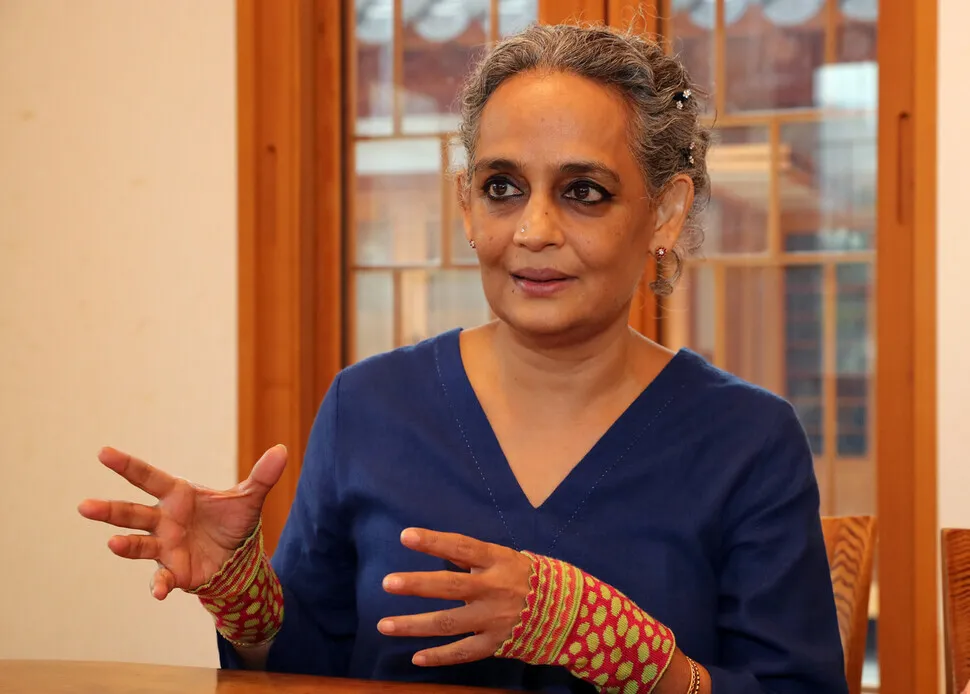
Park: In your previous work, “The God of Small Things,” you pulled your major characters from the private and rather personal experiences of your family, your relatives, your own home and places of work. Where did you get such amazingly wonderful and different ideas for borderline identities, such as a trans character?
Roy: Some people think “The God of Small Things” is a personal story, while some think it’s an imaginary story. The characters are not people I know, but they are people who are inspired by people and things that are known and walked to it and breathed and eaten and smoked. I always say that “Utmost Happiness” is like a city. You can drive through a city on highways and think you know it. But to really know it, you have to walk through it, to get a bit lost. To me, it is important to sit down and have a cigarette with all the minor characters. People in India, especially because of the caste system, are not named, but known as their class — a cobbler, a tailor, so on. But in “Utmost Happiness,” even the minor characters all have names and stories, and sometimes it's confusing. But after a time, you understand the pattern of what it is.
Park: So what do you think happiness is exactly? Since you've finished your work, “The Ministry of Utmost Happiness.” What kind of happiness do you want in your life?
Roy: While ”The God of Small Things” is about a traditional family with a broken heart at its middle, “The Ministry of Utmost Happiness” starts out with the smashed heart and then makes a non-conventional mended heart in a graveyard.
I think for writers, happiness is a beautiful sentence. Happiness is just thinking about some new novel coming over the mountains over there and saying, “Hello, I'm coming.” [Laugh.] One does not think about happiness or hope as some kind of thing you can find on Google Maps. It comes and goes, like sun and shade.
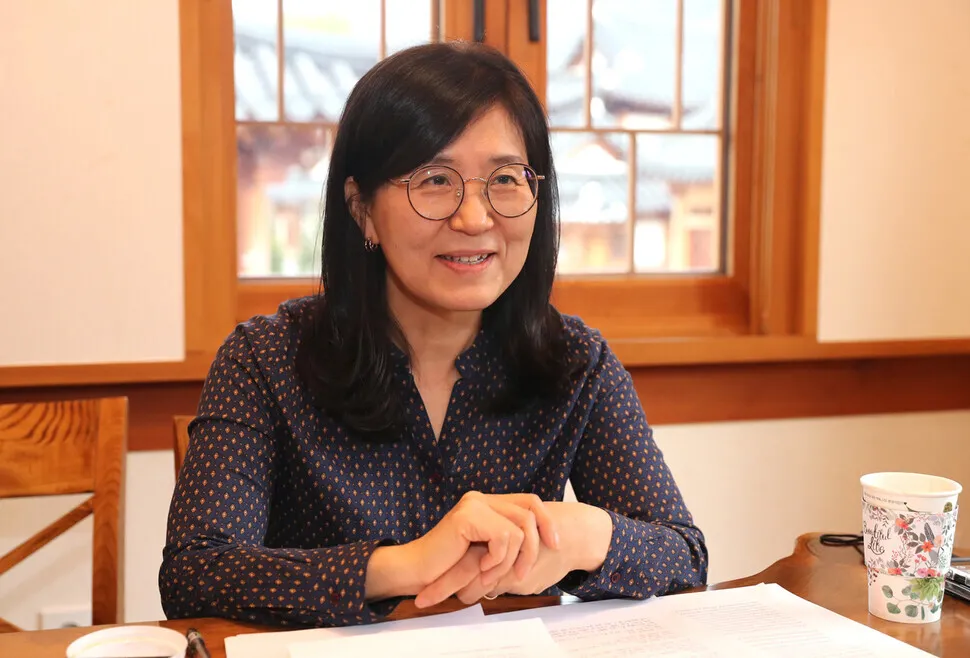
Park: Korea fought dictatorship and authoritarianism to achieve its democracy. At the present, even after democratization, we are finding that we are very unhappy. There is a huge gap between the rich and the poor, and many people have been evicted from their own farmlands or homes for the sake of development.
Roy: A democracy combined with the free market can't remain a democracy. There used to be a joke in India, that to create a good business climate one must kill people, push them off their lands. Therefore, at some point, a democracy has to become a police state in this guise. But it continues to have the elections and all that, meanwhile having laws that you cannot possibly call yourself a democracy while upholding.
Park: Despite Korea’s economic achievement, young generations still feel totally completely alienated from such affluence. They feel themselves to be poor, comparatively, and refuse to get married and have children or start families. Meanwhile, the suicide rate and poverty rate among older people are increasing.
Roy: If you don't actually address the problem of free-market capitalism, that's the natural consequence.
Park: Can you find any kind of hope while capitalism continues to grow stronger?
Roy: I think it's getting stronger, but I think, like you're saying, young people everywhere are beginning to understand the issue. In the US, I remember around 15 years ago you couldn't use the words “capitalism” or “class.” I wrote an essay called “Capitalism: A Ghost Story” about how these corporations have even taken over the pedagogy and certain kinds of imagination.
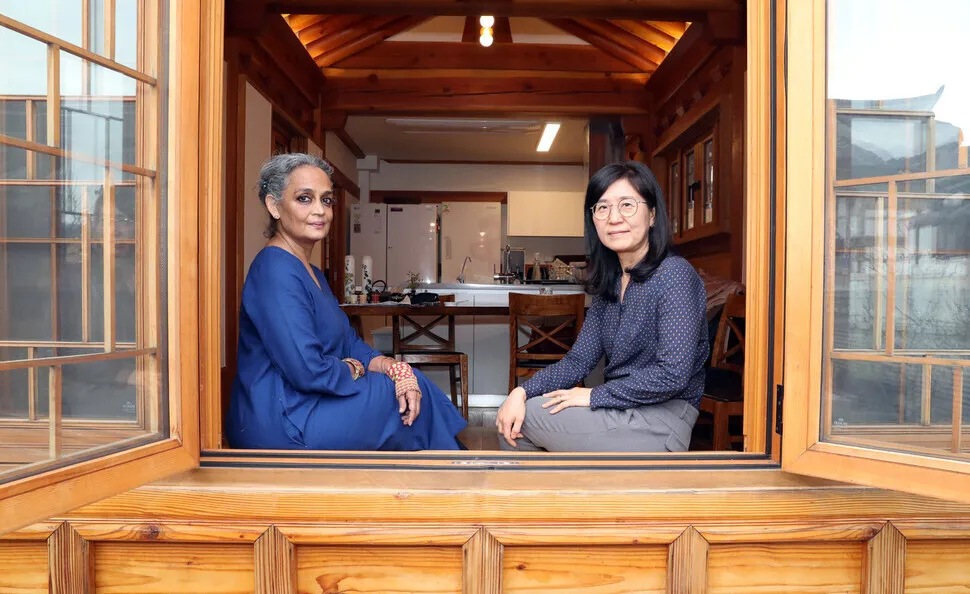
Park: To shift topics, I was a bit surprised at your comments on Mahatma Gandhi.
Roy: That’s in part because there is so much dishonesty attached to how that story has been built and it has been told. If you read, “The Doctor and the Saint,” it's about Gandhi and caste and race. That does not mean that everything about Gandhi is terrible, but his views on caste, on race, and on women were terrible. We are allowed to walk and chew gum at the same time — you can talk about views of his which we found visionary, but also call what was terrible, terrible. We can complicate him. We don't have to put a halo on his head. Doing so has caused a lot of damage in India.
Park: Whenever I read your essays or novel, I find that the way you use the English language amazing. It's not only excellent in using the language but also very rhythmic. Sometimes you use rhyme schemes like those found in poetry. I understand that you learned English at school. But some view English is a kind of legacy of British imperialism.
Roy: In India, you have this goddess called Kali who has many arms, and I say my Kali has fewer arms but many tongues. It’s not their English, it’s my English. I think it is a very Indian language. In India, it's the only language that binds the whole country. One imperial historian said to me, “The fact that your novel is written in English is a compliment to the British Empire.” Then, is jazz a compliment to slavery?
Park: You published your second novel after twenty years. Did you feel stressed during that time?
Roy: If I were a person who was expecting approval from people, I would not be writing these political essays I know everyone's going to attack me for. Writing is such an internal process to me.
Introduced and edited for clarity by Choi Jae-bong, senior staff writer
Transcribed by Chae Jin
Please direct questions or comments to [english@hani.co.kr]

Editorial・opinion
![[Column] Lee’s difficult task of striking a balance on Japan [Column] Lee’s difficult task of striking a balance on Japan](https://flexible.img.hani.co.kr/flexible/normal/500/300/imgdb/original/2025/0905/6317570584144597.jpg) [Column] Lee’s difficult task of striking a balance on Japan
[Column] Lee’s difficult task of striking a balance on Japan![[Editorial] Multipolar era means Seoul must broaden its diplomacy [Editorial] Multipolar era means Seoul must broaden its diplomacy](https://flexible.img.hani.co.kr/flexible/normal/500/300/imgdb/original/2025/0904/2017569747213826.jpg) [Editorial] Multipolar era means Seoul must broaden its diplomacy
[Editorial] Multipolar era means Seoul must broaden its diplomacy- [Column] North and South Korea are no longer pawns in US-China-Russia relations
- [Column] Who we fail when we oversimplify the ‘comfort women’ issue
- [Column] How Seoul can navigate its security in a shifting world order
- [Editorial] Former first lady’s indictment is consequence of her acting as though she were president
- [Correspondent’s column] A report card for the Lee-Ishiba summit
- [Editorial] America’s penchant for plundering allies
- [Editorial] Kim Jong-un’s return to diplomacy could be the start of a tectonic shift
- [Editorial] Lee clears first hurdle with Trump, but the race is not over yet
Most viewed articles
- 1Trump’s temperamental tariffs aren’t the win Americans think they are
- 2Real-life heroes of “A Taxi Driver” pass away without having reunited
- 3USFK sprayed defoliant from 1955 to 1995, new testimony suggests
- 4Hanbok vs. funeral attire: Fashion highlights political divide as legislative session kicks off
- 5[Editorial] Multipolar era means Seoul must broaden its diplomacy
- 6Former bodyguard’s dark tale of marriage to Samsung royalty
- 7“A bundle of blackened bones”: The search for unmarked graves of those killed in Gwangju Uprising
- 8Young Korean men shifted even more to the right since last presidential election
- 9Lee and Trump establish rapport at summit, but experts say challenges remain
- 10[Column] Lee’s difficult task of striking a balance on Japan